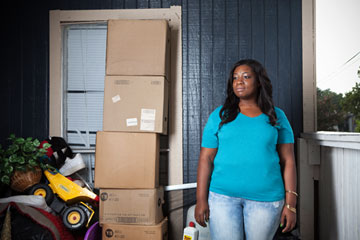
An uninsured single mother of two, Nicolette Cooksey is one of nearly 2 million Texans who would have been covered under the Affordable Care Act if the state had opted to expand Medicaid.
As soon as 10-year-old raven anthony comes home from school, she takes off her shoes, has a drink of water and eats a bowl of cereal while watching sesame street. the same routine takes place every weekday. School, home, shoes, drink, cereal, Sesame Street. Raven is severely autistic. She does not speak and did not walk until she was 3. She is prone to asthma attacks and becomes emotionally unstable if she is away from school or home for more than a few hours. Raven's strict after-school regimen is vital to keeping her stable and calm.
Raven's life requires constant hands-on management by her mother Nicolette Cooksey, who is single and has another daughter, a 5-year-old named Nariyah. Like 6.1 million other Texans, Cooksey doesn't have health insurance. She works part time at a Houston day-care center, but her weekly hours are capped at 19.5--just under her employer's 20-hour threshold for benefits. She already owes about $13,000 in medical bills and has no chance of paying them off at her current salary of $8.10 an hour. "I don't know my exact credit score, but I'm sure it's terrible," Cooksey, 30, says. "If I want anything in life, I have to pay my medical bills first."
The Affordable Care Act (ACA)--or Obamacare--was designed to provide coverage for two-thirds of the nearly 48 million U.S. residents like Cooksey without health insurance. But as the centerpiece of the law takes effect--the marketplaces where people can buy health insurance, called exchanges, launched on Oct. 1--the reality looks far different, and not only because of the congressional drama over efforts to kill the law altogether. Twenty-seven states declined to set up exchanges or cooperate with the federal government to run them. And many are finding other ways to prevent the law from working as planned. The day before a federally operated exchange launched in Missouri, the state's lieutenant governor urged residents not to sign up. In Florida, a directive from Governor Rick Scott blocks navigators--consumer-assistance workers paid through the ACA--from working with county health departments. And Georgia's insurance commissioner has said his department will do "everything in our power to be an obstructionist." Such efforts guarantee that a federal law may look very different depending on what part of the country you're in.
Obamacare suffers from other startup snafus. Confusion is widespread: a recent survey by the Commonwealth Fund found that those most likely to benefit from the new insurance exchanges and subsidies to purchase coverage know the least about them. Meanwhile, parts of the law have been delayed--a requirement that employers with at least 50 workers offer health insurance was postponed until 2015 after pressure from business groups. And then there are the glitches: on the first day of enrollment, most exchange websites had technical problems caused by overwhelming demand and computer-system malfunctions that rendered them unusable.
The cumulative effect of political opposition, public confusion and the sheer complexity of launching the largest new entitlement in almost 50 years means many Americans who stand to benefit from Obamacare don't realize it, while millions of others who are uninsured will get no relief at all. And it may be years before anyone can measure success or failure.
First Hurdles
